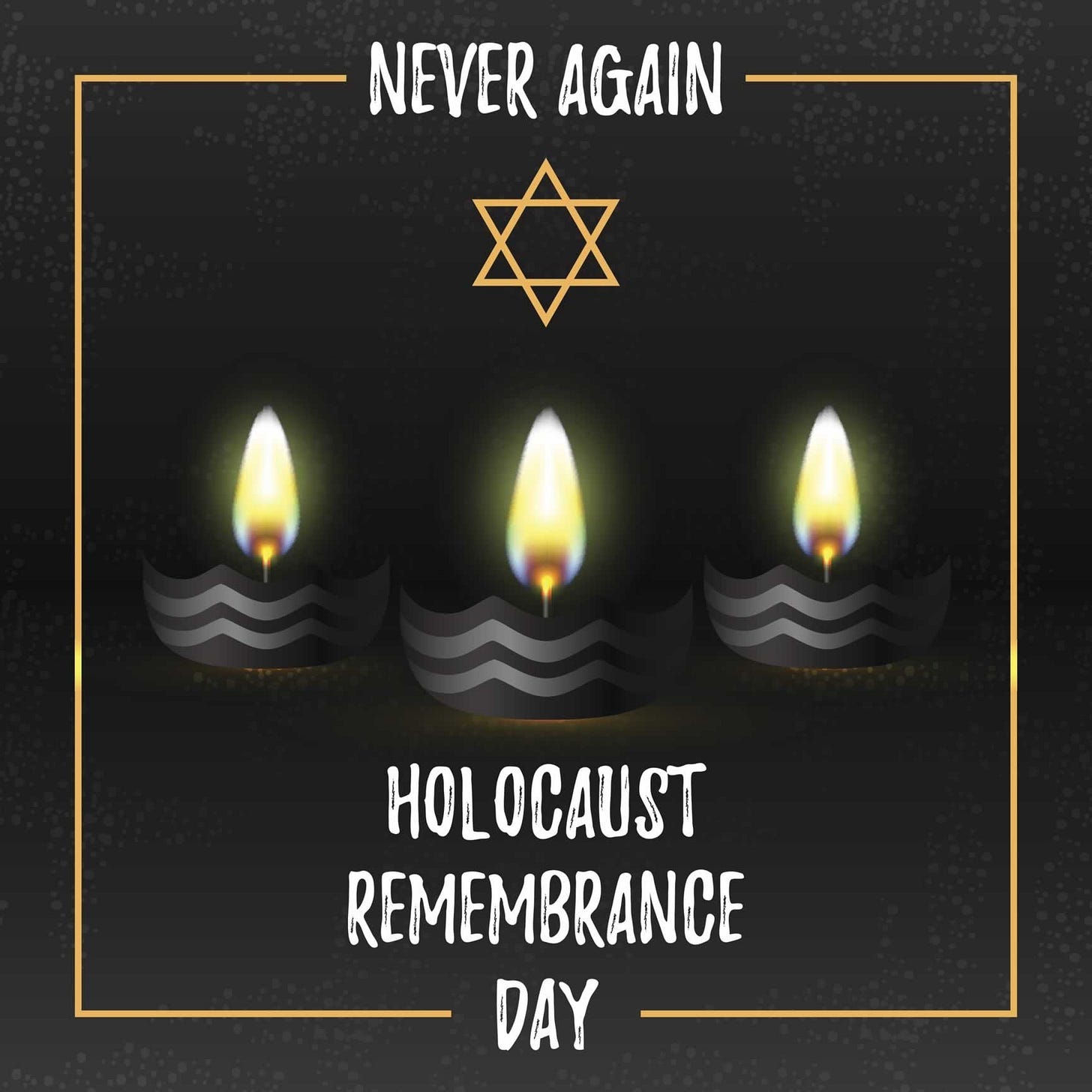Holocaust Remembrance Day: Lest History Repeat Itself!
By Stephen Wilson, one of our reporters abroad
Many survivors of war remain reticent about the war. It is a nightmare they would rather forget. This is understandable.
But real fear and anxiety that history is set to repeat itself make marking the commemoration of National Holocaust Memorial Day on 27th January {i.e. the anniversary of the liberation of Auschwitz by the Russian army in 1945} an imperative necessity. It is more than just an awareness day! This day can be used by advocates to ask three questions: 1 -- What happened? 2 -- Why did it happen? and 3 -- What can we all do to prevent such events?
We should not be afraid of raising such questions or of the disagreement it might provoke. The main point is to keep any discussion wide-open and open-ended, as well as open minded.
"I am a child survivor of the holocaust. In 1943, I was forced to flee my birthplace in Belgium and went across war torn Europe and dangerous seas until I was able to come to the United Kingdom in 1947. When I hear you using words describing refugees as 'swarms' and an 'invasion' I am reminded of the language used to dehumanize and justify the murder of my family and millions of others. Why do you need to use that kind of language?" declared an 83-year-old survivor Joan Salter, who had fled the Holocaust during the Second world war to the current British Home Secretary Sarah Braverman.
The Home Secretary had been using toxic rhetoric of how housing shortages, N.H.S. waiting lists and other problems were caused by illegal migrants. She and others applauded comments criticizing Royal National Life Boats rescuing migrants in the sea rather than leaving them to drown! Just as the Jews were made scapegoats for economic problems, so are the refugees and migrants of today. Salter argued that the Holocaust of the death camps began with words and we should weigh every word carefully.
The Home Secretary refused to apologize for her rhetoric.
Soon afterwards, Salter stated, "She needs to look into her humanity rather than dehumanizing a group of people many of whom are absolutely desperate. "If Joan Salter aimed to raise awareness of the Holocaust on the eve of the remembrance day of 27th January she certainly exceeded beyond expectations. As many as 5 million people watched a video of her taking on the Home Secretary.
The Home Office was so embarrassed they asked a group of advocates to stop showing the video!
Disbelief, disgust, and anger are just some of the emotions experienced when young children first hear about the Holocaust. They ask things such as, “Can people really have treated such people in such a callous way?” I recall meeting one of my 12-year-old students of English telling me how shocked she was at hearing about those events.
But I also heard a lot of complacency. I recall a discussion between my father and mother about this issue. My father stated, "The British would never treat people like this. Only the Germans could do this!" My mother retorted, "Don't you believe it. Look at the way football hooligans behave here. They could do this in Britain."
“How could it happen?’ and “What could be done to prevent this?” are the questions which are on the minds of advocates who are discussing the role of “ordinary people.” They argue that the Holocaust was not just committed by a few group of inhuman fanatics or Nazis but made possible by the role of ordinary people who acted not only as perpetrators, but bystanders and those who stood aloof. In other words, indifference is more dangerous than crazed fanatics.
According to the Holocaust Memorial Day Trust, “Genocide is facilitated by ordinary people. Ordinary people turn a blind eye, believe propaganda, join murderous regimes. And those who are persecuted, oppressed and murdered in genocide aren't persecuted because of crimes they have committed—they are persecuted simply because they are ordinary people who belong to a particular group {e.g. Roma, Jewish community, and Tutsia}. “The argument is that ordinary people have choices and can refuse to support this genocide. They can refuse to arrest or execute people, help and hide refugees and find ways of opposing regimes.
This claim reminds you of the view of how the Holocaust was mainly facilitated not so much by extraordinary people but by 'the banality of evil.' Many of those who took part were seeking to boost their careers or enjoy a better standard of living. If you encountered such people who commit those deeds they would not strike you as monsters or evil. In fact, they may come across as helpful and perfect family members.
A survivor of Sobibor (Nazi extermination camp located in the forest near the village of Żłobek Duży in World War II German-occupied Poland) Toivi Blatt stated, “The nice person on the street, you ask him ‘Where is North Street?’ and he goes with you half a block and shows you, is nice and kind….
That same person in a different situation could be the worst sadist. Nobody knows themselves. All of us could be good or bad people in these different situations."
In an interview by the journalists who made the “World at War” series in the 1970's, Hitler's favorite architect Albert Speer warned that in regard to Hitler “that it is necessary to know that he was a human being, that he could be charming, that he could treat those around him nicely and so on.” Speer warned that Hitler did not look like a monster and future dictators may also come across as kind people who would never harm a fly. The commandant of Auschwitz, Rudolf Hoess, did not strike people as dangerous or evil. The American lawyer Whitney Harrison who interrogated him at Nuremberg stated that he reminded him of “a normal person, a grocery clerk.” Polish inmates also stated that Hoess was just like an ordinary person you walked past every day and hardly notice. He was also very quiet and in control of his emotions!
Such a view questions past notions of genocide being simply committed by an elite of fanatics with a particular authoritarian personality. So what turns a person into a Nazis?
There was some research into the upbringing of the Nazis which did suggest some pointers. What some research found was that many of the Nazis came from a childhood where they were brought up to not show any emotions, were subject to strict discipline, were beaten up by their parents and were not loved by their parents. That might well be.
The problem is: Why is it that other Nazis belonged to families where there parents showed them a lot of care, affection, and love?! It is not unreasonable to question the very notion of an authoritarian personality presented by the Frankfurt school of thought. It might partially explain the actions of some fascists but certainly not all!
I think there are some assumptions which need to be challenged. For example, it might be assumed that the perpetrators of the Holocaust were poorly educated, ignorant and badly brought up. For instance, if you look at the example of Hitler, he was badly educated and his German was full of spelling errors as well as grammar issues and mistakes. However, if you examine the backgrounds of the Nazis, you will find they often had doctorates and were highly educated.
There was no correlation between having a good education and not doing evil. Your level of education and culture does not render you immune from committing atrocities. Colin Wilson who wrote “A Criminal History of Mankind” {2005} claimed that the worst crimes were committed by highly intelligent people. {What he means by intelligent people is highly questionable!}
Noam Chomsky argued that there is no correlation between highly educated people and lack of support for oppressive governments. He found that the more educated people tended to support the Vietnam War in contrast to the least educated. Not all education inspires critical thinking. This is why many people have argued that education alone can't prevent any future genocide or rather our existing education system needs to be radically reformed!
Why was fascism so alluring and attractive to so many Germans? Many Germans stated that they felt very happy belonging to the Hitler Youth. They felt enraptured by a new sense of purpose and aim in their lives which was previously missing. They felt a new sense of belonging! They could enter a new community which offered brotherhood. They felt very proud at being told they were the best people in the World and had a special mission to carry out.
Nazism had the appeal almost of a new religion which offered simple answers to complex problems. It freed people from the anxiety of doing too much thinking…
We should also not underestimate the romantic appeal of Nazism which was encouraged by mass torchlight parades, extravagant events and mass meetings, plus dramatically-designed military uniforms.
My personal encounters with fascists suggest they can indeed be ordinary people drawn into the 'romance' of fascism. When I was at a hospital in Scotland I worked with a polite, charming and affable trainee nurse. One day he invited me to his room. He attempted to persuade me to join his Neo-Nazis movement: 'The British Movement.' It was an odd meeting with an air of surrealism. He gave me a lecture on how there was a Jewish communist conspiracy to rule the world. Then he started to play some old Nazi songs on his tape recorder. He played “Tomorrow Belongs to Me” and even a Nazi song from war film he had recorded. He told me "I know you will find my arguments hard to believe but what I'm saying is true.” I was a bit shaken and didn't know how to respond. We argued. He seemed so confident that his movement would succeed.
He told me "One day when our movement takes power I will be summoned by them into playing an important role." When I went for a walk with him in the park and we dropped into a museum we both saw late 19th century clothes which woman once wore. He thought the examples in the display looked great. It dawned on me that this was a diehard romantic. It was a far stretch for me to imagine such a person taking part in future repression. This all happened in 1982!
Years later in Moscow I recall how I noticed a Russian in some type of military uniform selling an extreme right wing newspaper. An older woman was scolding him for being a fascist. I got a good look at this man. He looked harmless. He told me "Ignore that woman. She is just mad!"
Around ten years passed and I met this man again. There was no mistaking his face. I met him again when I dropped into a war game club in Moscow. I was surprised to find that he was the organizer of the club. He greeted me with pleasure and welcomed my visit. We even played a few games. But he was no monster. In fact, he was very helpful and would give visitors free rules for playing games as well as advice on how to paint figures. Once when I visited the club I noticed he had left a fascist newspaper lying on the table. I shuddered! When he noticed my dread he simply “smirked” like a badly-behaved schoolboy.
The good news is that the trainee nurse as well as two university students I met who were reputed to be Fascists changed their views. For instance, one university student donated money to the anti-Apartheid cause when a bucket was passed around the student union. Another became an academic who became a conservative. Further, and the trainee nurse changed his views. I asked the trainee nurse why he had changed his views and quit the British Movement. He told me "I think I received so much hassle from people when I told them my views and then I began to realize may be there is something evil about this movement. I was even thinking of sending the names of members to the security services." I don't know if he did that. But then he later told me he had become a born again Christian. This time he was trying to convert me to his brand of Christianity. Well at least it did not sound as bad as fascism.
As for the explicit racism against the Jews I came across a lot of this in Moscow. For instance, I met a student who told me the film “Schindler's List” was just “Jewish propaganda” and that “Jewish people born in Russia can't be Russian.” I disagreed. She threatened to leave my classroom.
Once, in and international library, when a visitor heard I was reading the theologian Alexander Men, he told me "I don't like this Jewish influence on the Orthodox Church. You should not read him." And when I visited Moscow State University, a student asked me "What do you think of the World Jewish Zionist conspiracy?" I just groaned in reply saying I don't accept this idea.
Having so many of those unpleasant encounters I can readily understand why any person of Jewish roots might feel alienated and intimidated. You would begin to feel a little paranoia! When I read that the Journalist Laurence Lee had been shocked to come across many young people who openly expressed anti-Semitism in Eastern Europe it came as no revelation. I felt like telling him "Join the club."
And how can we prevent such things happening again? I think there is a danger we can act very counter-productively in our acts. We should stop using the term fascist as a mere term of abuse and use it very specifically! We can see that when people in the conflict in Ukraine accuse each of being fascists they can easily dehumanize people in such a way it leads to atrocities.
When we talk about fascism we are speaking about an extreme nationalist ideology which insists that its nation or race is superior to other nations and groups and it is based on a dictatorship which suppresses any opposition. This is not a term to use lightly!
The German philosopher Niezsche warned that in fighting monsters be careful you don't become a monster yourself. Some anti-fascists state we should boycott classes where fascists attend and even blacklist them. But other teachers argued it was more productive that we talk to them and tactfully suggest they themselves should question such views. I'm not sure that shunning or haranguing them works.
Three of the fascists who I became acquainted abandoned their former views. They were mostly talked out of their views or saw things in a different light.
Colin Wilson points to examples where psychologists managed to persuade Nazis to give up their views simply by encouraging them to ask particular questions they had never thought of before…
Look at the gentle approach used when Joan Salter addressed the Home Secretary. Salter was at least open to some kind of dialogue in order that doubts might just be sown in the Home Secretary's mind. {Although I don't think the Home Secretary is a fascist} Salter must have inspired a lot of soul searching. This is crucial. The Home Office is literally deporting refugees back to be tortured and murdered.
The former British prime-minister Tony Blair actually deported a Libyan dissident Abdel Hakim back to Libya to be tortured by the then Libyan Dictator Al Quadaffi.
In 1938 the Czechs would not allow fleeing Jews refuge in their country. Instead they banned their entry—in effect sending them back to the Nazis!
We cannot allow the powers that be the right to deport fleeing refugees to certain persecution by dictators. We have to prevent this!
Commemorating 27th January should serve to remind us of committing such follies!
.
.
Recommended sources
“Hannah Arendt: The Portable,” Peter Baehr, Editor. London: Penguin Books, 2001. From the philosopher who coined the famous phrase 'The banality of evil' and how ordinary as well as banal the Nazis were.
Michael Burleigh, “The Third Reich: A New History, 2001. London: Pan Books.
Richard Holmes, “The World at War, 2007. Edbury, Britain: BBC Random House.
Ian Kershaw, “Hitler: An Abridged Version, 2008. London: Penguin Books.
Laurence Rees, “Auschwitz: The Nazis and the Final Solution,” 2005. Edbury, Britain: BBC Random House.
Pete Tobias, “Liberal Judaism: A Judaism for the Twentieth Century,” 2007. London: Montagu Center.
Colin Wilson, “A Criminal History of Mankind,” 2005. London: Mercury.
.
For children, I recommend the following
Jess Brallier, “Who Was Albert Einstein?” London: Penguin Workshop, 2002. It is very good at not only in explaining the Theory of Relativity in an accessible way but on how Einstein spoke out against the Nazis and was forced to flee from them as a refugee.
Susanna Davidson, “The Holocaust,” 2008. London: Usborne Young Reading.
Anne Frank. “The Diary of a Young Girl,” 2001. London: Penguin Books. This book about a young girl in hiding stresses so well the inner life of a refugee in hiding and how she reflected on all her hopes, aspirations and dreams.
Rob Lloyd Jones, “The Black Death,” 2018. London: Usborne Young Reading. This book is instructive because it mentions how Jews were blamed for the plague; and that in February 1349, 2,000 Jews were murdered in Strasburg—and in August 1348, 6,000 in Mainz, Germany.






